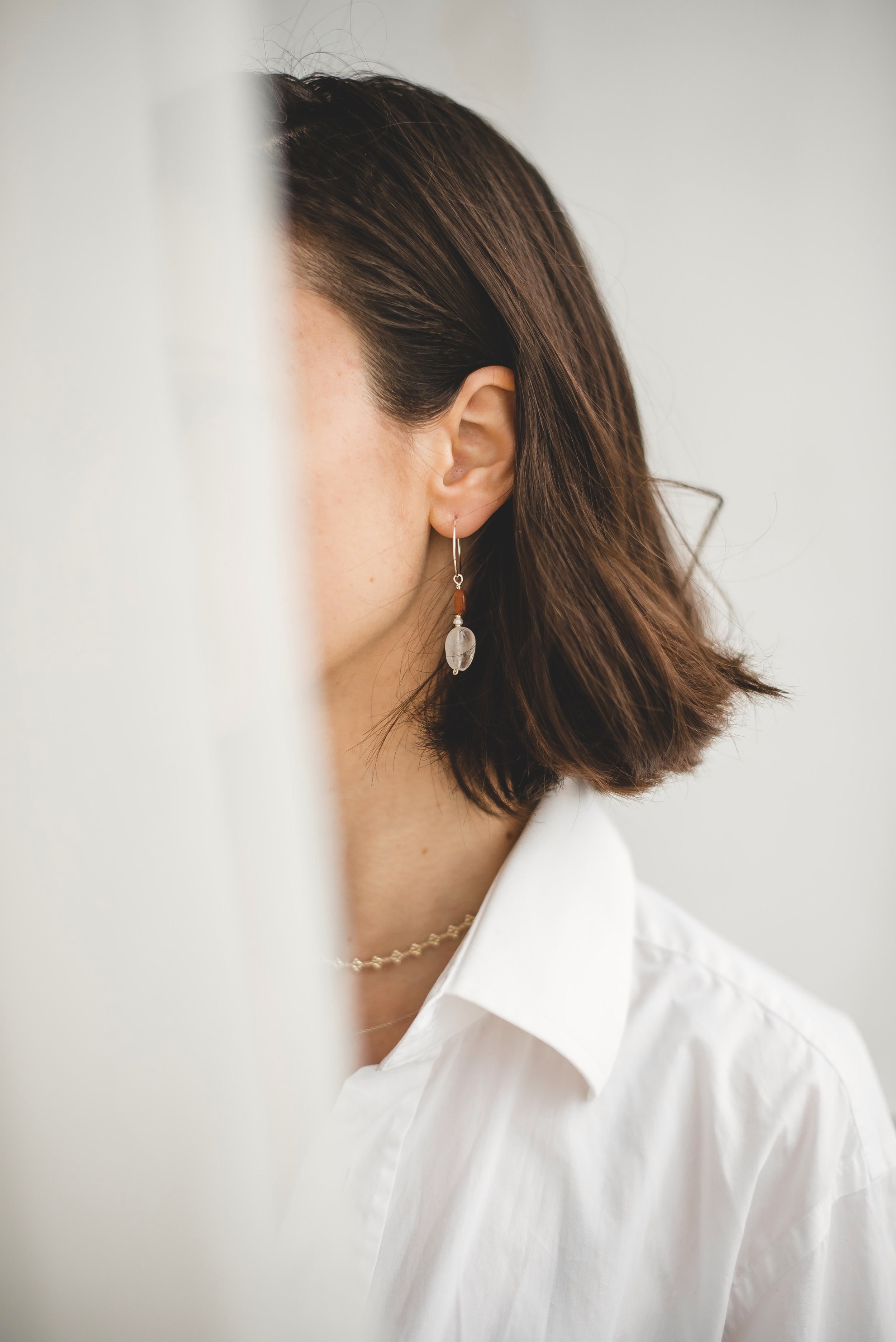A Recipe for Transforming Judgement Through Self-Compassion
September 7th, 2023 - Article Published for The Vital Creative Collection, Written by Charlotte Jade Askew
Photo by Ihssan Rami Azouagh
Ever walked into a room, taken one look around and realised you’re overdressed?
Same.
But what were your thoughts like after that? What about later in the night, when you were introduced to someone who looked fabulous?
We’ve all been there, that itchy, sticky feeling. Crispy jealousy, satisfying judgment.
The trouble is, the feeling of satisfaction isn’t real. It is a temporary relief, a kind of humanising that happens when we recognise our vulnerabilities in others. We judge because we’re trying to dispel the tension from within ourselves.
Photo by Andrey Avyaginstev
Judgement reveals you, not them.
The judgements we make are the crux of our own vulnerabilities. We judge because on some level, we feel insecure about whatever it is that we are judging.
You don’t like how loud she is? Chances are you wish you were more confident.
You’re making negative comments about their success? You probably don’t feel good enough.
You think they spend too much on flashy stuff? There is probably a part of you that wants more money or freedom.
That person who looks fabulous, you tell yourself (or your friend) they’re overdressed, and it comes from the part of you that’s worried about how you look.
Or maybe, you’re joining in on judgement. Someone in your circle is making the remarks and you comment your agreement, even if you don’t believe or have any kind of affinity with what is being said — because there is a desire within you to fit in, to belong, to be liked.
When we harbour a wound or void, it feels ‘good’ to judge someone else about that same thing or something similar. In a way, it’s us attempting to shift the blame or normalise our struggles. We WANT other people to feel the same way we do, to see ourselves in others, to know we’re not alone in our hurts. That’s the place judgment comes from.
Photo by Ihssan Rami Azouagh
We judge because we fear being judged.
What you see in others then, is actually the unresolved parts of yourself. A mirror to the healing you can do to liberate yourself from the blocked emotions and beliefs that prevent you from the creativity you’re capable of, the relationships you desire, and the fullest expression of yourself.
In this way, judgment is our asset. A tool, to be utilised for insight and growth.
Photo by Jasmin Chew
Exposing the unresolved parts of you
A healthy mind, heart, body, and soul is not just about how you speak to yourself, it is about also how you speak about others — whether in your mind or with your voice:
Unkind thoughts have the same effect as unkind words; your brain doesn’t know the difference between you saying it out loud and thinking it with your mind. Energetically the effect is the same, pain.
Using your judgements as a tool neutralises their negative energy and impact. Instead of something that generates heavy energy, your judgements become a window into your own soul and a catalyst for growth.
If you find yourself judging someone else, pause, turn inward, and investigate. Chances are, you need to do some work on self-love.
Photo by Kateryna Hliznitsova
Self-Investigation
Here are some questions you can ask yourself in the moment to reframe and redirect the energy you’re giving to judgement:
Do I have any worries/insecurities in this space?
Is it necessary for me to be thinking this?
It is kind?
What benefit do I get out of thinking this thought?
Is the emotional energy attached to this thought (e.g., jealousy, fear, disappointment) aligned with who I want to be?
Does it serve me to think about this other person in this way?
Photo by Mathilde Langevin
Judgement is seductive.
Ooo it feels good. I know. It can feel so enticing to make comments about others. To conspire with friends. To laugh and joke and feel validated in your thoughts. To puff-up because, hey, at least you didn’t do THAT.
We feel good when we judge, briefly, because for the moments that we’re saying it, we forget our own flaws. The spotlight isn’t on us, and we feel superior. Not only do our judgements make it easier to understand the world by reducing and simplifying other people's behaviour, but they also give us the illusion of control in the sense that we can feel like our opinions are ‘right.’
The catch is, that there is no ‘right’.
We fool ourselves into ego-centric importance. Applying our lens for life to everyone else. Our ideas are not THE ideas, and we’re entitled to them but not to the exclusion of all others, and not in a way that enforces the compliance of others. Compassion for ourselves and compassion for others is our highest and most helpful state of being. If you’d like to see a change in others, a change in the world, your greatest source of power lies in you embodying the change you wish to see.
Photo by Klara Kulikova
Cultivating Compassion
How then, do we keep ourselves out of judgement? The answer is compassion. Compassion for the self and compassion for others, and compassion for others truly begins with compassion for the self. So that is our starting point. We cannot give to others what we do not have.
Finding it within yourself to love yourself entirely, wholly, for all the flaws and vulnerabilities, is the birthplace of opening yourself up to loving others without qualification. Which, to be very clear, does not mean loving them without boundaries. Judgements come from a place of focus on the ‘other’, that stems from our innermost insecurities, whereas boundaries are a focus on the self from a place of self-love.
Photo by Jasmin Chew
The Recipe for Self-compassion
Ingredients
1 Cup – Mindfulness
1/2 Cup – Challenging Self-Criticism
1 Cup – Insight
3 Teaspoons – Forgiveness
Sprinkle – Seek Support
Method
Begin by noticing yourself, become aware of your inner voice and start to listen to how you talk to yourself.
Gauge the quality of that voice. (How kind is it? Is everything it says true? Does everything it says serve you?)
Make a study of yourself. Learn your weaknesses and how you sabotage yourself. We must unearth the wounds to heal them. Use your judgements as a tool for turning inward. Dig into them, go deep. They will give you the answers to the questions above.
Meditate on forgiveness. Decide to forgive yourself for the judgements you have made. Know that they came from a place of hurt within you and choose to go forward without them. Every time you find a judgement creeps in, use it as feedback, the fuel for your growth, and offer a kinder thought or statement to that person.
Find yourself a therapist or coach who you feel a resonant vibe with. Take your time, give yourself permission to switch if you don’t feel you’re connecting. Sometimes we cannot see the leaves for the trees when it comes to ourselves —which is to say, we get so caught up in thinking we know ourselves, that we cannot see the parts that don’t fit into our idea of ourselves. Your greatest asset is another perspective and someone who has spent years learning how to help you identify and heal your vulnerabilities.
Photo by Elise Wilcox
An avenue of responsibility.
Focusing on others' flaws puts you energetically into a state of lack. Your attention and your time are your most precious resources. They can be a gift, but they lose this value when you use them to diminish others. The message you send out in terms of the electromagnetic signature of your thoughts, is ultimately: I’m not enough.
When you speak or think harshly of others, you communicate a deep-rooted anger inside of yourself. When you speak or think down about others, you communicate the fears within yourself. When you criticise others, you communicate the insecurities and bitterness you unwittingly hold onto.
How you treat others, in your mind and in this physical realm, reveals a lot more about who you are, than who they are.
Your insecurities cause you pain; when you judge, you intensify this pain and put it out into the world. You likely were not responsible for your wounds, but you are responsible for your healing. You cannot be healed if you do not first make a choice. Take your power back, and let this be the start of the most glorious version of you.
—Charlotte Jade Askew, In-House Writer at Casey Jacque
Instagram: @inner_chatter










